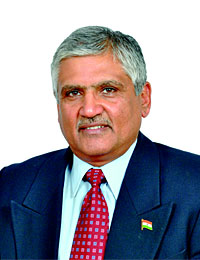Publisher's Note
 India successfully hosted the 18th G20 Summit in New Delhi during 9-10 September, 2023 under the theme of “One Earth, One Family, One Future”. Our country was voice of addressing contentious environment issues and climate change in G20 summit. Apart from other important issues, climate and energy was discussed. The G20 backed a target of tripling global renewable energy capacity and referenced the need for emissions to peak before 2025. It also acknowledged limiting warming to 1.5 degrees Celsius (2.7 degrees Fahrenheit) which will require slashing greenhouse gases 43 percent by 2030 from 2019 levels.
India successfully hosted the 18th G20 Summit in New Delhi during 9-10 September, 2023 under the theme of “One Earth, One Family, One Future”. Our country was voice of addressing contentious environment issues and climate change in G20 summit. Apart from other important issues, climate and energy was discussed. The G20 backed a target of tripling global renewable energy capacity and referenced the need for emissions to peak before 2025. It also acknowledged limiting warming to 1.5 degrees Celsius (2.7 degrees Fahrenheit) which will require slashing greenhouse gases 43 percent by 2030 from 2019 levels.
Over the coming decades, India is expected to see continued strong economic growth that will bring with it an expanding middle class and higher living standards. In the process of this growth, industrial activity is rising and the demand for energy is growing. But the country is also facing a huge challenge: reduce its emissions intensity 45% by 2030 and reach net zero by 2070.
“Few would disagree that one of the most urgent societal challenges we face today is addressing the risks of climate change. How we meet the world’s demand for the energy necessary for economic growth while mitigating the long-term impact on our environment is key to our sustainable future.” – Darren W. Woods, Chairman, ExxonMobil. Industrial activity accounts for nearly a quarter of India’s emissions. While powering facilities with a lower-emission fuel like natural gas is one step towards meeting climate goals, ensuring that industrial machinery works efficiently is also essential. By considering the economic benefits of eco-friendly maintenance practices, companies can make informed decisions about where to invest their resources. While there may be some upfront costs associated with implementing these practices, the long-term cost savings and benefits can far outweigh these costs. Ultimately, eco-friendly maintenance practices can improve a company's financial performance while also contributing to a more sustainable future. Sustainability involves producing lubricants with minimal environmental impact, conserving resources, developing products, embracing social responsibility, and complying with regulations.
Eco-friendly maintenance is an essential practice for companies that want to reduce their environmental impact, improve their bottom line, and enhance their reputation. By implementing best practices for reducing carbon footprint in maintenance operations, using tools and technologies for sustainable maintenance, and overcoming challenges to adoption, companies can achieve significant results. Continuous improvement is also critical to achieving long-term success. Companies can improve their sustainability performance, reduce costs, and improve asset performance.
Let us embrace a more environmentally conscious future by nurturing our planet today. Sustainability isn't merely a choice; it signifies our collective responsibility to safeguard the Earth. Together, let's take significant steps towards ensuring a sustainable future for everyone.
Power plants, especially turbines, are expected to operate with high reliability and with control lable operating and maintenance costs. The cover story details a study in which in-service gas turbine oils from three different power plants were sampled and analyzed — the results indicates that the monitoring of insoluble varnish together with soluble varnish improves the diagnostic and early correction of varnish problems. Some other topics covered in this edition includes: Preventing equipment failure, condition-based oil changes, lubrication program development, dispersancy testing, assessing oxidation condition and lubricant refreshment in turbine oils, the importance of a lubricant list and much more. We look forward to your support and feedback to enable us to improve the content and layout of Machinery Lubrication India. We welcome readers to participate by sending their feedback & contributing articles and case studies. We look forward to the continued patronage of the advertisers and the subscribers.
Warm regards,
Udey Dhir
